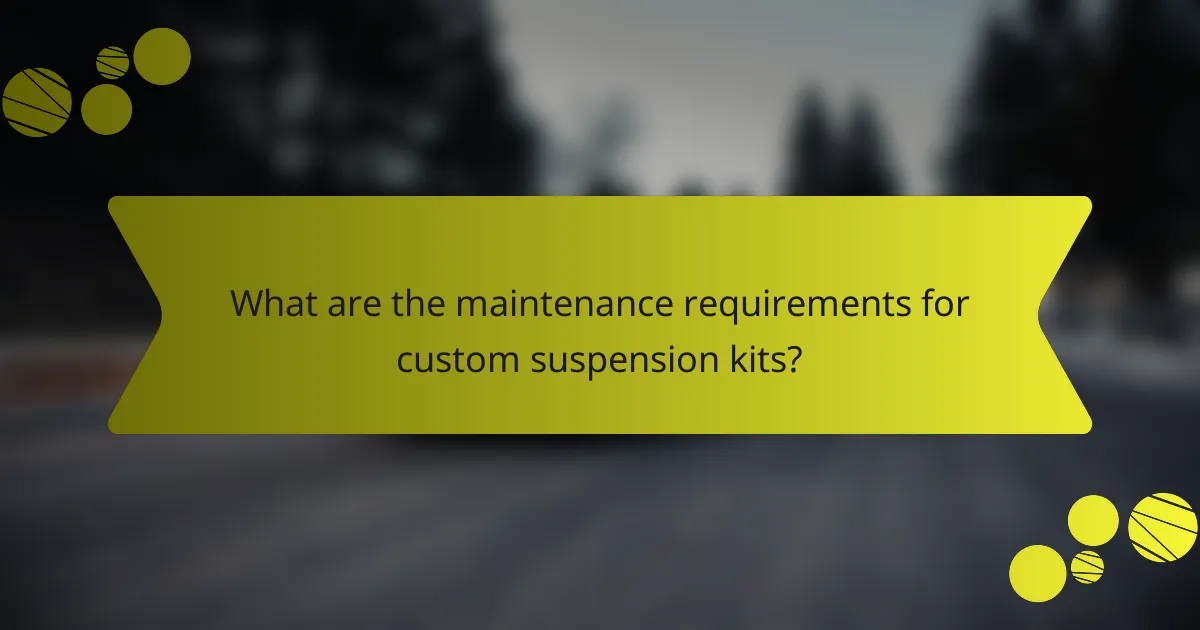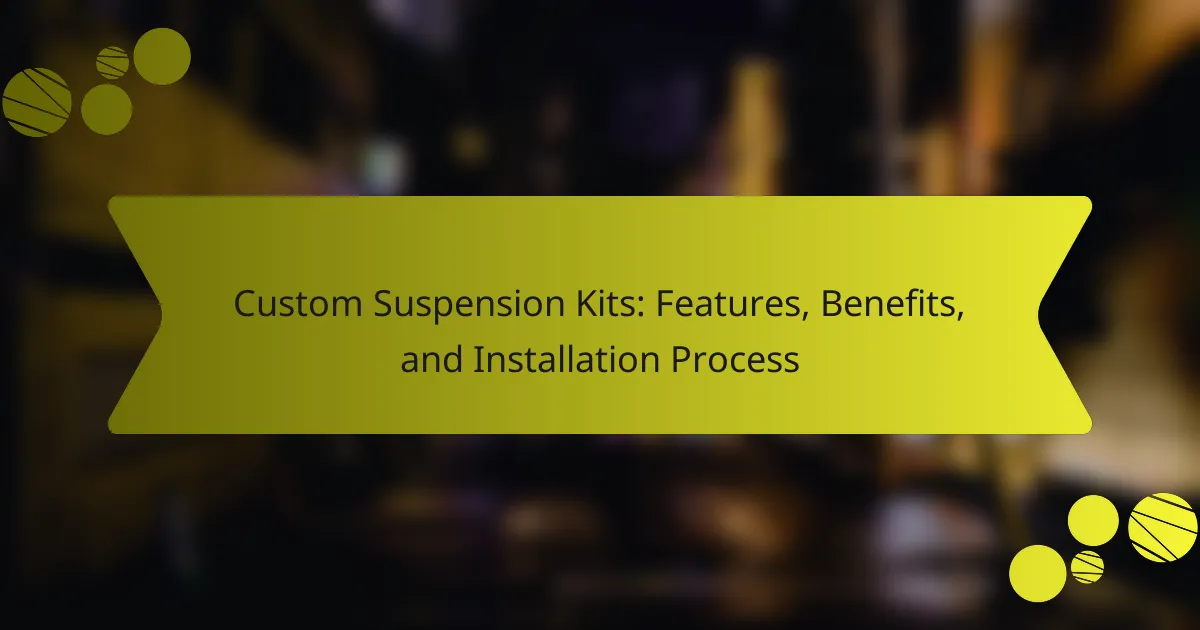Custom suspension kits enhance vehicle performance and ride quality, offering adjustable features tailored to individual driving preferences. This article explores key features, benefits, and the installation process of these kits. It also addresses vehicle-specific considerations, maintenance needs, and common misconceptions about custom suspension systems. Understanding these aspects can help vehicle owners make informed decisions for optimal performance.

What are the key features of custom suspension kits?
Custom suspension kits offer enhanced vehicle performance, improved ride quality, and customization options. Key features include adjustable ride height, varying spring rates, and compatibility with different vehicle types. These kits enhance handling and stability, allowing for tailored driving experiences. Installation typically involves replacing factory components, ensuring proper alignment and fitment for optimal performance.
How do different suspension types affect performance?
Different suspension types significantly influence vehicle performance, affecting ride quality, handling, and stability. Coilover kits offer adjustable height and damping, enhancing customization. Air suspension provides comfort and versatility, allowing for variable ride height. Leaf springs excel in load-bearing capacity, ideal for trucks. Each type serves unique driving needs, impacting overall performance.
What materials are commonly used in custom suspension kits?
Common materials used in custom suspension kits include steel, aluminum, and composite materials. Steel offers durability and strength, while aluminum provides lightweight properties and corrosion resistance. Composite materials are often used for specific components to reduce weight and improve performance.
Which brands are recognized for quality custom suspension kits?
Brands recognized for quality custom suspension kits include Fox Racing Shox, Bilstein, Eibach, King Shocks, and Rancho. These brands are known for their durability, performance, and extensive customization options. Each brand offers unique features tailored to specific vehicle needs, enhancing ride quality and handling.

What benefits do custom suspension kits offer?
Custom suspension kits offer enhanced ride quality, improved handling, and increased vehicle stability. They allow for personalized adjustments to suit driving preferences and conditions. Additionally, these kits can provide better ground clearance and accommodate larger tires. Custom suspension systems often use high-quality materials, ensuring durability and performance.
How do they enhance vehicle handling and stability?
Custom suspension kits enhance vehicle handling and stability by allowing precise adjustments to ride height, damping, and spring rates. These modifications lead to improved traction and cornering performance. Enhanced stability results from a lower center of gravity and optimized weight distribution. For example, adjustable coilovers enable drivers to fine-tune suspension settings for different driving conditions, increasing overall control.
What impact do they have on ride comfort?
Custom suspension kits significantly enhance ride comfort by improving vehicle stability and absorbing road imperfections. These kits allow for adjustments in damping and spring rates, leading to a smoother driving experience. For instance, a properly installed custom suspension can reduce body roll during cornering, enhancing overall handling. Additionally, the ability to tailor suspension settings to personal preferences results in a more enjoyable ride.
How can custom suspension kits improve off-road capabilities?
Custom suspension kits significantly enhance off-road capabilities by improving vehicle stability and traction. These kits provide increased ground clearance and better shock absorption, allowing vehicles to navigate rough terrains more effectively.
The features of custom suspension kits include adjustable ride height, specialized dampers, and reinforced components. These elements contribute to improved handling and comfort during off-road driving.
Installation of these kits typically involves replacing factory components with upgraded parts tailored for specific off-road conditions. Proper installation ensures optimal performance and safety during off-road adventures.
In summary, custom suspension kits are essential for off-road enthusiasts seeking to maximize their vehicle’s performance and adaptability in challenging environments.

What is the installation process for custom suspension kits?
The installation process for custom suspension kits involves several key steps. First, gather necessary tools and components, including the suspension kit, jack stands, and wrenches. Next, lift the vehicle securely and remove the existing suspension components. Then, install the new custom suspension parts according to the manufacturer’s specifications, ensuring proper alignment and fit. Finally, lower the vehicle and test the suspension for functionality and safety.
What tools and equipment are needed for installation?
To install a custom suspension kit, you need specific tools and equipment. Essential items include a jack, jack stands, wrenches, sockets, a torque wrench, and a screwdriver. Additionally, having a spring compressor and a pry bar can facilitate the installation process. Proper tools ensure safe and effective installation, enhancing the performance of the suspension system.
How long does the installation typically take?
The installation of custom suspension kits typically takes between 4 to 6 hours. This duration can vary based on the vehicle type and the complexity of the kit. Proper installation ensures optimal performance and safety.
What are common challenges during installation?
Common challenges during installation include alignment issues, inadequate tools, and complex instructions. These factors can lead to improper fitment and performance problems. Ensuring that all components are compatible and following the manufacturer’s guidelines can mitigate these challenges. Additionally, a lack of experience may result in mistakes that could affect the suspension system’s functionality.

How do custom suspension kits vary by vehicle type?
Custom suspension kits vary significantly by vehicle type, affecting performance and handling. Each vehicle has unique weight distribution, suspension geometry, and intended use, influencing kit design. For instance, off-road vehicles require more robust components for durability, while sports cars prioritize responsiveness and lower ride height. Additionally, trucks may focus on load-bearing capacity. These variations ensure optimal performance tailored to specific driving conditions and vehicle characteristics.
Which features are essential for trucks versus cars?
Trucks require features like enhanced load capacity and off-road capability, while cars focus on fuel efficiency and comfort.
Essential features for trucks include heavy-duty suspension systems, larger tires, and towing capabilities. Cars typically emphasize lightweight construction, streamlined aerodynamics, and advanced safety features.
Trucks often have unique attributes such as adjustable ride height and reinforced frames for durability. In contrast, cars may include rare attributes like hybrid powertrains for improved fuel economy.
Overall, the choice between trucks and cars hinges on intended use, with trucks designed for rugged tasks and cars optimized for everyday commuting.
How do suspension kits differ for performance vs. daily driving?
Performance suspension kits prioritize handling and responsiveness, while daily driving kits focus on comfort and stability. Performance kits often feature stiffer springs and adjustable dampers, enhancing cornering and reducing body roll. In contrast, daily driving kits use softer springs to absorb bumps and provide a smoother ride. The installation process for both types varies, with performance kits generally requiring more precise adjustments to optimize vehicle dynamics. Daily driving kits typically involve simpler installation, emphasizing ease of use and comfort.

What are the maintenance requirements for custom suspension kits?
Custom suspension kits require regular inspections, adjustments, and occasional replacements to maintain optimal performance. Key maintenance tasks include checking for wear on components, ensuring proper alignment, and adjusting settings based on driving conditions. Regular cleaning of parts can prevent dirt accumulation, which may affect functionality. Inspecting bushings and joints for signs of damage is essential for safety and performance.
How often should suspension components be inspected?
Suspension components should be inspected every 10,000 miles or at least once a year. Regular inspections ensure optimal performance and safety. Factors such as driving conditions and vehicle usage may necessitate more frequent checks. Inspect for wear, leaks, and alignment issues to maintain the integrity of custom suspension kits.
What signs indicate a need for maintenance or replacement?
Signs that indicate a need for maintenance or replacement of custom suspension kits include unusual noises, decreased ride comfort, uneven tire wear, and excessive body roll during turns. Regular inspections can help identify these issues early. Monitoring these signs ensures optimal performance and safety.

How do custom suspension kits impact vehicle warranty?
Custom suspension kits can potentially void a vehicle’s warranty if they alter the original manufacturer’s specifications. Many manufacturers specify that modifications may lead to warranty claims being denied. It’s crucial to check the warranty terms before installation. Some manufacturers offer warranties that cover aftermarket parts, provided they meet certain criteria. Understanding these details helps vehicle owners make informed decisions about modifications.
What should owners know about warranty coverage with modifications?
Modifications like custom suspension kits can impact warranty coverage. Owners should review their vehicle’s warranty terms to understand potential exclusions or limitations. Modifications may void certain aspects of the warranty, especially if they affect the vehicle’s performance or safety. It’s advisable to consult with the manufacturer or a dealership before making modifications to ensure compliance with warranty requirements.
How can modifications affect insurance premiums?
Modifications like custom suspension kits can increase or decrease insurance premiums depending on several factors. Enhanced performance features may raise risk, leading to higher premiums. Conversely, improvements in safety and handling can lower premiums. Insurers evaluate the impact of modifications on vehicle value and risk profile.

What are the common misconceptions about custom suspension kits?
Many believe custom suspension kits are only for performance vehicles, but they enhance comfort and handling for all types of cars. Another misconception is that installation is overly complicated; many kits are designed for user-friendly installation. Some think they are only adjustable for height, while they can also improve ride quality and stability. Lastly, there is a belief that these kits are prohibitively expensive, but options exist for various budgets.
Why do some believe they compromise safety?
Some believe custom suspension kits compromise safety due to concerns about handling and stability. These kits can alter the vehicle’s center of gravity, potentially affecting traction. Additionally, improper installation may lead to mechanical failures. However, when correctly installed, these kits enhance performance and ride quality, addressing safety concerns effectively.
What myths exist regarding installation difficulty?
Many myths suggest that installing custom suspension kits is overly complex. In reality, while the process requires some mechanical knowledge, it is manageable for most DIY enthusiasts. Common misconceptions include beliefs that only professionals can install these kits or that extensive modifications are necessary. In fact, many kits come with detailed instructions and require basic tools. Additionally, the installation time can vary, but it often takes only a few hours. Understanding these aspects can demystify the installation process and encourage more enthusiasts to upgrade their vehicles.

What are the best practices for choosing a custom suspension kit?
To choose a custom suspension kit effectively, prioritize compatibility, adjustability, and quality. First, ensure the kit fits your vehicle model and intended use, whether for off-road or street performance. Next, consider adjustability options, which allow tuning for ride height and stiffness. Lastly, select high-quality materials for durability and performance.
Which factors should be considered based on driving style?
Driving style influences the selection of custom suspension kits significantly. Key factors include vehicle type, driving conditions, and personal preferences.
1. Vehicle type: Consider the weight and design of the vehicle.
2. Driving conditions: Assess whether the primary use is on-road or off-road.
3. Performance goals: Determine if the focus is on comfort, handling, or off-road capability.
4. Adjustability: Look for kits that allow tuning for different driving styles.
5. Spring rates: Choose based on load requirements and driving dynamics.
6. Installation complexity: Evaluate your ability to install the kit or need for professional help.
How can users ensure compatibility with their vehicle?
To ensure compatibility with their vehicle, users should verify specific details about their vehicle’s make, model, and year. Key factors include suspension type, lift height, and weight capacity. Consulting vehicle manuals and manufacturer guidelines can provide essential compatibility information. Additionally, users may benefit from seeking expert advice or using online compatibility tools provided by suspension kit manufacturers.
What expert tips can enhance the selection process?
To enhance the selection process for custom suspension kits, prioritize compatibility, quality, and adjustability. Research the specific vehicle model to ensure proper fitment. Evaluate materials used for durability and performance. Consider user reviews for real-world insights. Lastly, consult with experts or professionals for tailored recommendations.
What common mistakes should be avoided when selecting a kit?
When selecting a custom suspension kit, avoid common mistakes like choosing based on price alone, neglecting compatibility with your vehicle, overlooking installation complexity, and ignoring reviews. Ensure you prioritize quality, vehicle specifications, and the intended use of the kit.



